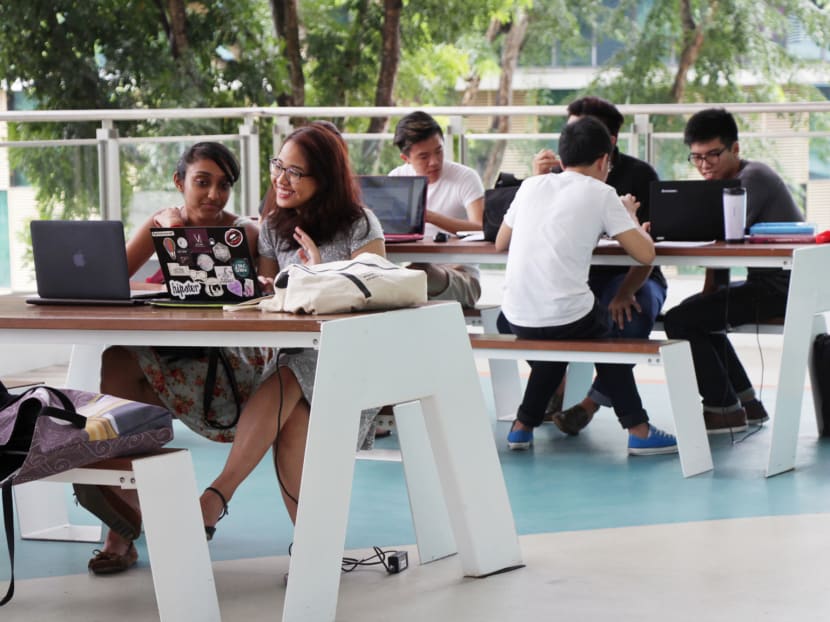Polys, universities to take in more students based on interests, not just grades
SINGAPORE — Polytechnics and universities will have more room to admit students based on their talents and interests rather than just grades, under enhancements to current aptitude-based admission schemes.
SINGAPORE — Polytechnics and universities will have more room to admit students based on their talents and interests rather than just grades, under enhancements to current aptitude-based admission schemes.
At the polytechnics, the Direct Polytechnic Admissions intake allowance will be raised to 12.5 per cent from the current 2.5 per cent, and the scheme will be renamed the Early Admissions Exercise (EAE), beginning from the Academic Year 2017 intake.
Institute of Technical Education graduates will also have a shot at gaining admission to polytechnics based on aptitude, with a new EAE (I) scheme that will allow up to 10 per cent of the ITE intake to be admitted under this exercise.
At the university level, Nanyang Technological University, National University of Singapore and Singapore Management University will be able to admit up to 15 per cent of their annual intake under the Discretionary Admissions Scheme — up from the current 10 per cent. It will also begin with the AY2017 cohort.
Announcing this during the Ministry of Education’s Committee of Supply debate on Friday (April 8), Acting Education Minister (Higher Education and Skills) Ong Ye Kung spoke of the importance of helping students be curious and engaged in what they are learning, in order to encourage lifelong learning — a necessary skill for success in the real world. “If we can stay curious, we are more likely to make that subject a lifetime pursuit. If we make it a lifetime pursuit, we achieve mastery,” said Mr Ong.
Studies by the MOE have shown that among students with similar O-Level aggregate scores, those admitted to polytechnics through the DPA do better in their studies and are more likely to continue in careers in the sectors they were trained for, he noted.
In response to queries, the MOE said the attrition rate of students admitted through the DPA is half that of students admitted through other O-Level admission exercises like the Joint Admissions Exercise.
Students admitted through the DPA were also 30 per cent more likely to be employed in jobs at least somewhat related to their course of study.
“This confirms what may have been intuitive to us all along — when you are able to choose and enter a course you are interested in or feel passionate about, you feel more ownership and enthusiasm, and (are) likely to do better,” said Mr Ong.
The current Joint Polytechnic Special Admission Exercise will be folded into the EAE, which will take place in June and July each year. A total of 75 courses, or one-third of the total number of polytechnic courses, will be allowed to admit up to half of their students based on aptitude-centric assessments, up from 30 per cent.
The exercise will also accept applications from students with exceptional talents in areas such as leadership, community service, and sports and arts. The exact mode of assessment under the EAE may vary across courses and can include interviews, submission of portfolios and aptitude tests.
The MOE said polytechnics have admitted about an average of 600 students each year through the DPA from 2013 to 2015, or about 2.4 per cent of the total polytechnic intake. Based on existing numbers, close to 15 per cent of the polytechnic intake would be admitted through the EAE and EAE(I), MOE added.
Even as the Government seeks to recognise the importance of nurturing students’ interests, there will be students who have yet to find their way. “We should not be pushing the young to rush into declaring their interests prematurely. … If a young person has yet to discover his area of interest, the system should give him more time for self-discovery,” Mr Ong said.
He also stressed that unlike admitting students on a discretionary basis, admitting students based on aptitude is not a case of “you can’t meet the academic cut off and therefore I take your sports, community work into account and I deem that you meet the cut off”.
Aptitude-based admission will consider factors like relevant experience, interest and aspiration of the applicant, such as a mature worker with 17 years of experience in the food and beverage industry, who managed to enrol in a diploma course relating to food science. “These are kind of examples we can have more of,” said Mr Ong.







